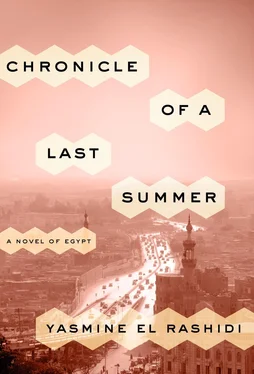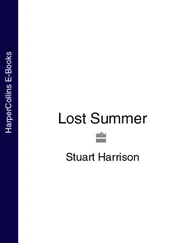Yasmine El Rashidi
Chronicle of a Last Summer
Part One: Summer 1984, Cairo
The house was blistering. Mama had drawn in and closed the wooden shutters hours earlier. Damp towels lay rolled on windowsills. The heat still seeped in. She now sat at one corner of the sofa, gray phone receiver in one hand pressed to her ear, plant mister in the other. She sprayed her face at intervals. Mama had always said the heat never bothered her. It was how she was made. That summer had been different. I sat at her feet staring at the muted TV screen, getting up and flipping between channels. Channel One. Channel Two. The third channel stopped its broadcast at one p.m. There were only two programs for children. I flipped hoping I might find something. In the corner of the room was Granny’s old metal fan. It clicked and whirred, drowning out Mama’s English-laced Arabic. I could make out none of the conversation, except to take note when she switched to French. It was the single language she spoke that I still didn’t know. She seemed to use it more often that summer.
I had no way of measuring time, but we sat like that for hours. Ossi appeared now and then at the doorway and meowed. Mama ignored him. He was gray with long hair. Mama had said it was a bad idea to have a Persian. If one were to have a cat, it ought to be a local, a baladi . Baba said let the girl have what she wants. He brought him home in the palm of his hand one day. The day I turned five. I wanted to call him Fluffy. Mama said Fluffy was not a proper name. She called him Osama. Baba never touched him again. He was allergic, even though his hands were huge. He would put me onto his palm and lift me into the air. I would sit perched like that as he watched TV. I missed Baba’s hands, especially his giant fingers. He would make a hook out of them and pretend he was hooking my neck like a fish, pulling me close to kiss him. I loved the way Baba smelled. You could smell him everywhere in the house, especially on the sofa. Even when he went on trips his smell would still be there. It had gone away this time. I was waiting for him to come back. Every day after school I would get out my class notebook and turn back the pages to the one with the green star in the corner for the day he left. I would flip to the next page. Then the next page. I counted until I reached fourteen. I kept counting until the page we used in school that day. Fifty-seven. I couldn’t tell how many extra days it had been.
It was July but I was still in school. My cousins had four months of summer holiday. Sometimes five. We only had one. It was the English school. In Arabic school there was no homework. The teachers didn’t make enough money to correct it. I wanted to be in Arabic school like my cousins. It wasn’t fair. Mama shook her head. Four months of summer would make of me a listless child. Too much holiday was bad for character, Mama said. Poor posture was also a sign of it. That summer it had become a concern. Mama finished her phone call and told me to walk across the room with a book on my head. She made me do this each afternoon. I made it like a game. I especially liked when the book began to slip. It tilted to the right and I felt it. I bent my knees. It was as if I were going to jump, take off, but I slid back up, pushing my right shoulder. It slipped back into place. It only ever slid to the right. The next time it fell. It was an old book with a thick blue cover. It said SUEZ. It hit the parquet floor with a thud. I glanced back at Mama nervously. I saw she wasn’t watching.
It was a school night but Mama had stopped paying attention to time. I stayed up late with her. I took out my sketchbook. I drew. Fish. The bottom of the sea. Myself swimming with them too. The teacher shook her head. She told me I had to watch myself, I was a dreamer. I turned to the TV. They were replaying pictures of starving children in Ethiopia. Every day we watched them. Mama had a friend from Ethiopia. She taught me how to count to ten in their language. Whenever she came for lunch she said a prayer before she ate. She said it was for the famine. She told me to look at the food on my plate and remember how lucky I was. With each bite I should remember Ethiopia. Maybe I should send my lunch to Ethiopia? Every time I see the starving children on TV, I say a prayer. I don’t know what to say but I put my head down like Kebbe and move my lips. I then say Allahu Akbar , like Grandmama does. I whisper so that Mama can’t hear. There are also starving children in Cairo, but they never show them on TV. I see them in the streets on the way to school. They sell lemons at the traffic light. Three of them sleep in a cardboard box under the bridge next to our house. One of them has hair like mine. I know if I stand next to her the tops of our heads will meet. I want to talk to her but when I smile and start to roll down the window one day, Mama tells me to look away. I’m not to encourage such behavior. I turn my head down. I look at her from the corner of one eye.
After the famine they replay the documentary about Sadat. They show him with his wife and children. They show him meeting important people. They show him at the parade where he was killed. I was three and three-quarters when they killed him. It was the day of Mama’s birthday. We were watching TV. Mama put her hands to her mouth. Baba stood up. They gasped, then were silent, then Mama started saying Quran. I was too young to remember. Baba told me everything about Sadat. He did very good things and very bad things. Making peace with Israel was very bad, Baba said. He didn’t like the Israelis. They were buggers. Mama grumbled that he shouldn’t use that word again. They wouldn’t tell me what buggers were but I knew they were bad. Everyone we knew hated the Israelis, except for one of Baba’s cousins. Baba raised his eyebrows at him and shook his head. He turned and looked into my eyes. He had signed his name to fight in the war. It was important to be loyal to my country.
Next they play the video of the new president, Mubarak. He was sitting next to Sadat when he was killed. They said it was a miracle he wasn’t killed too. It was something from God so they made him president the next week. Now he was always opening a new factory. They show him cutting the ribbon and shaking people’s hands. Baba said it was the making of a pharaoh. I got up and changed channels. Channel Two. The black-and-white film with Ismail Yaseen. It screened on Thursdays after school. They would play things in order and many times over. The TV was mostly boring but Mama only let me watch videotapes on weekends. She said only boring people got bored. I felt bored every day after school. I got up and put the last tape into the VCR. I hit rewind. It made a sound like an airplane passing. Mama tutted. When it finished rewinding it clicked three times. I pressed eject. It made a rumbling noise then squeaked as it came out. I put it back in its case and onto the shelf next to the five VHS tapes Baba said were for me. There were other tapes on the higher shelf. They were adult. I went back to Mama’s feet. She was on the phone changing languages between English and Arabic and French. I heard her say it was the only thing she had. I knew she was talking about the house. They can forget it . She switched to French and I heard her say Baba’s name.
I bring out my writing notebook from school. We have to write a story from our day. I draw a blue frame around the page. In one corner I put the date. I count down four lines and write: I am sitting with Mama waiting for the power to cut. At the bottom I draw a picture of Mama on the sofa. I draw a vase with sunflowers like in the films. I watch the flickering TV screen until the power cuts. We don’t say anything when it happens. It cuts every evening then there is silence. Even from the street all sound stops. We stay in the living room, not moving, until it comes on again. Some days Mama gets up and moves to the balcony. She takes the phone. The cord is so long it also reaches the bathroom. Usually she just stays on the sofa misting herself. The cuts last one hour. Sometimes two. Some days, in the winter, they skip a day. We all have power cuts. Only three of my friends at school don’t have power cuts. Their fathers are important. One of my best friends has a grandfather who is important. He is dead now, but they are still important. They never have power cuts. Mama also says the Sadats never have them. They are related to us, but not close enough for our power cuts to stop too.
Читать дальше

![Маргарет Миллар - Rose's Last Summer [= The Lively Corpse]](/books/384369/margaret-millar-rose-s-last-summer-the-lively-c-thumb.webp)










